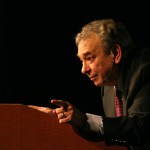On today’s DL show, I taught the second part of a series concerning rules of interpretation of the Bible:
Monthly Archives: December 2014
A Two Hour Drive
The following is a transcript taken from the first question and answer session at the 2014 Ligonier National Conference.
Questioner: “This couple writes, ‘we live in a rural area without access to solid Biblical teaching, let alone Reformed teaching. The nearest Church with such teaching is two hours drive away. How should we choose a group to meet with and serve when we disagree with the things taught from the pulpit?’ What would you say practically to this couple?”
 Dr. R. C. Sproul: “Drive two hours!”
Dr. R. C. Sproul: “Drive two hours!”
Questioner: “Drive two hours?”
Dr. R. C. Sproul: “Lots of people do. Its that important. If you had to go to the hospital and it was a two hour drive you wouldn’t stay home. You would go to the hospital. You wouldn’t go to a dog pound because it was convenient. Would you?
Seriously! I mean its the old thing. I learned this from a former coach of the Pittsburgh Steelers, Chuck Noll. His phrase was “whatever it takes!” and the spiritual nurture of your soul and of your children’s souls are so important that if you have to drive two hours for worship, and for instruction in apostolic truth, then that’s an obvious decision. You drive two hours, or move! But it has to be a priority in every Christian family to be somewhere where there is true worship, true gospel, true doctrine, for the sake of eternity.”
To view the interaction, it can be found at the 36 minute mark on this video:
Preaching
These four lectures by Dr. Tim Keller (from the John Reed Miller Lecture Series) given at Reformed Theological Seminary, Jackson, Mississippi, on Nov. 11-13, 2014, are an outstanding resource and help for all preachers. I recommend them highly.
Lecture 1: What is Good Preaching?
Audio mp3
Lecture 2: Preaching to Secular People and Secularized Believers
Audio mp3
Lecture 3: Preaching the Gospel Every Time
Audio mp3
Lecture 4: Preaching to the Heart
Audio mp3
Messiah in the Old Testament
Questions to ask an Evolutionist
and two ties. How could this happen? The answer is they had no offense.
A Christian Game Plan
This is where many Christians are in their efforts to witness to unbelievers. The Bible instructs believers to have answers when challenged by any and all who oppose the Word of God (defense—1 Peter 3:15). The Bible also instructs believers to bring down all strongholds and anything that exalts itself against the knowledge of God (offense—2 Corinthians 10:4–5). Sadly, while many Christians lack the knowledge to challenge unbelievers (offense), they also lack a defense.
What is meant by defense and offense in Christian witnessing? Defense means that the Christian can answer questions such as: How do you fit dinosaurs into the Bible? Where did Cain get his wife? How could Adam name all the animals in one day? What about carbon-14 dating? Does God really exist? Couldn’t God have used evolution?
Offense means the Christian can ask the unbeliever questions that challenge his or her worldview. The strategy of asking good questions can be used to demonstrate to unbelievers that their belief in evolution is a sort of “blind” faith and is not something derived from empirical science. They can also illustrate to the compromised Christian (a person who professes to believe in both the Bible and ideas such as evolution or millions of years) that God’s Word is a completely accurate record and is not to be modified by secular opinions of what is possible.
There are several different types of questions that are useful in apologetics; we will cover four general categories of questions in this chapter. Questions can be used to help us assess and clarify the worldview of the critic. What does he really believe, and how is he using the terms? We will call these “clarification questions.” We can ask “foundation questions” about the most basic laws of science, and the beginning of first things. There are “textbook questions”—questions that can expose inconsistency in common textbook claims. These are particularly useful in public school settings. And finally, there are worldview questions—questions that can be used to show that the evolutionary worldview is utterly, intellectually defective.
Clarification Questions
These questions are used to help explain the meaning of words or terms. A definition in science needs to be clear and precise. It should include all the attributes that distinguish it from all other entities. If any of these attributes are missing, then the definition becomes ambiguous.
What do you mean by evolution?
What do you mean by theory?
What is meant by a fact in science?
Let’s examine some examples of the importance of establishing definitions. Continue reading
Rightly Dividing the Word of Truth
Historical Theology
A major resource:
and issues which have played significant roles in the history of the church. The courses are constructed around three major periods: (1) Pre-reformation, A.D. 33–1500; (2) The Reformation period, A.D.1500–1648; and (3) The Modern Age, A.D. 1648 to the present. Gnosticism, Arianism, Nestorianism, Church Councils, Anabaptism, Catholicism, the Reformation, the Puritans, and the Great Awakening, are examples of the subjects discussed. The last period is devoted to a survey of American Christianity.”
Historical Theology II: 27 Lectures
King’s Church, Phoenix is now on sermonaudio.com
Phoenix is now on sermonaudio.com!!
Sunday’s sermon “A Divine Appointment” (based on Acts 13:43-52) is now uploaded at this link.
